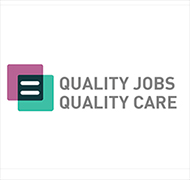23 March 2017
 With the number of people aged over 65 in Australia forecast to double in the next 20 years the University of South Australia’s pioneering research project Quality Jobs Quality Care is delivering the tools aged-care providers need to enhance job and care quality across the aged care sector.
With the number of people aged over 65 in Australia forecast to double in the next 20 years the University of South Australia’s pioneering research project Quality Jobs Quality Care is delivering the tools aged-care providers need to enhance job and care quality across the aged care sector.
Significant growth in aged care means providers are increasingly employing a diverse workforce to provide essential services to a complex client group and are looking for innovative ways to build sustainable, high-quality care services.
UniSA partnered with RMIT University, Flinders University, three leading aged care providers and an aged care union, to deliver the Quality Jobs Quality Care Toolkit to address these challenges.
Lead researchers, UniSA Adjunct Professor in the School of Management and Professor in RMIT’s School of Management, Sara Charlesworth, and Flinders University Associate Professor, Deb King, say the research found the quality of care services for older persons very much depends on the quality of the working conditions under which employees provide those services.
“Direct care workers are the majority of the aged care workforce and are critical to the future of the aged care sector,” Prof Charlesworth says.
“Frontline care workers are often employed in poor quality jobs, with low pay, high time pressure and a lack of access to training and career opportunities and this poor job quality creates significant challenges and barriers to both recruitment and retention and to care workers’ capacity to deliver high quality care.
“The Quality Jobs Quality Care project was designed to support care workers working in community and residential care by helping aged care organisations make small changes to work practices that would improve both job quality for care workers and the care quality that older Australians receive.”
Associate Professor, Deb King says with the Quality Jobs Quality Care project a set of innovative workplace interventions was designed and then trialed in residential and community aged care situations to achieve the win-win outcome of improving the quality of jobs and the quality of care.
“The toolkit has been developed as a high quality customised resource to meet the particular needs and context of the Australian aged care industry and its large workforce of care workers,” Assoc Prof King says.
“By providing a step-by-step guide for individuals and teams in aged care organisations to design, implement and evaluate workplace interventions, job quality for care workers and care quality in their workplace can be significantly improved.”
Four aged care industry partners Brightwater, HammondCare, Helping Hand and United Voice actively contributed to the project’s research activities, and participated with the chief investigators and the research team on the Project Working Group with input from a Project Advisory Committee made up of industry stakeholders.
Interviews conducted with care workers revealed that they were often working under high pressure with clients who may have complex needs but that they were highly motivated to provide care that was respectful, individually tailored and of high quality.
“Care workers reported that job quality was enhanced by having enough time to provide good quality care, having access to predictable and steady work hours, receiving regular communication and feedback from supervisors, managers and co-workers and having access to regular, comprehensive and timely training,” Prof Charlesworth says.
“The simple fact is that good job design and work organisation that supports team communication, problem-solving and responsiveness to clients’ needs produces more effective care and better client outcomes.”
Research undertaken with industry partner Brightwater addressed the job quality issues of effective team work and team cohesion in a small aged care residence resulting from staffing model changes, with clinical care receiving greater focus due to increasing complexity of care needs.
Wellbeing and Dementia Support Coordinator at Brightwater, Wendy Hudson, says a ‘Wellbeing Mapping’ approach, which included bringing care and clinical staff together with the resident and family to share their knowledge of the individual and develop person-centred care strategies, was implemented over a six-month period.
“Two thirds of the facility’s care workers attended one or more mapping sessions. Information from each session was shared with all staff which supported improved communication and collaboration,” Wendy says.
“Care workers reported job quality enhancement including a sense of being valued and enabled to be more responsive to the needs of individual residents and for all staff there was an increase in mutual respect and understanding about respective work roles.
“Care quality was enhanced, with family members reassured and confident about care and there was a 100 per cent reduction in complaints related to care.”
The Quality Jobs Quality Care Toolkit
The toolkit provides useful and accessible tools and resources for supervisors, managers, human resource and other professionals in the aged care sector, suitable novice and experienced change practitioners alike. These tools and resources are also useful for organisations in related domains, such as public health and disability sectors.
The tools and resources within the Quality Jobs Quality Care toolkit integrate contemporary research evidence and established best practice on job and care quality, collaborative workplace interventions, small scale change and evaluation.
The toolkit also integrates key insights and learnings developed through collaborating with partner aged care organisations to trial a series of workplace interventions to improve job and care quality.
The Toolkit is available at http://www.qualityjobsqualitycare.com.au/
Media contact: Katrina McLachlan mobile: +61 414972537 email: katrina.mclachlan@unisa.edu.au


